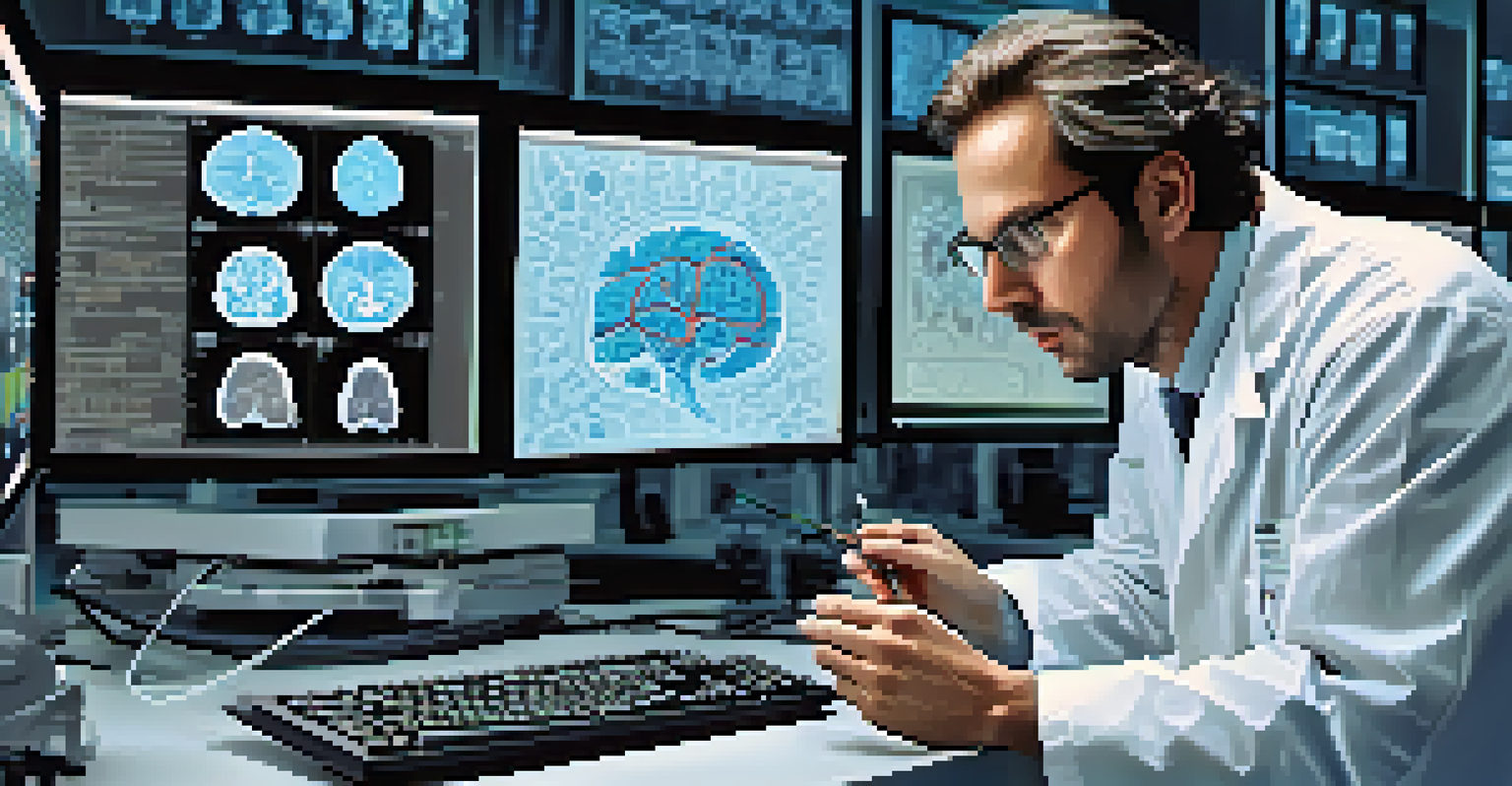The Intersection of Technology and Entheogen Research

Understanding Entheogens: A Brief Overview
Entheogens are substances that can induce altered states of consciousness, often used in spiritual or religious contexts. These substances, such as psilocybin mushrooms and ayahuasca, have been historically significant in various cultures. Today, they are being studied for their potential therapeutic benefits, particularly in mental health.
The experience of altered states of consciousness can lead to profound personal insights and a greater understanding of the self.
As research surrounding entheogens grows, so does the interest in their effects on the human mind and spirit. This resurgence is partly due to a growing body of evidence suggesting they can help with conditions like depression and PTSD. By understanding their cultural and historical contexts, we can appreciate their place in modern science.
Moreover, the dialogue around entheogens is evolving, leading to a more nuanced view of their role in society. This shift can help destigmatize their use and highlight their potential for positive change in mental health treatment.
The Role of Technology in Entheogen Research
Technology is transforming the way we conduct research on entheogens. Advanced imaging techniques, for instance, allow scientists to observe brain activity in real-time after administering these substances. This kind of detailed analysis helps researchers understand how entheogens interact with the brain on a biochemical level.

Additionally, data analytics and machine learning are streamlining the research process. By analyzing large datasets, researchers can identify patterns and correlations that were previously overlooked. This technological integration enhances the efficiency and effectiveness of studying these complex substances.
Entheogens Aid Mental Health
Research indicates that entheogens like psilocybin and ayahuasca may provide therapeutic benefits for conditions such as depression and PTSD.
Finally, technology plays a crucial role in the dissemination of research findings. Online platforms allow for rapid sharing of results, fostering collaboration across the globe. This interconnectedness accelerates the pace of discovery in the field of entheogen research.
Ethical Considerations in Entheogen Studies
As with any research involving human subjects, ethical considerations are paramount in entheogen studies. Informed consent is crucial, ensuring participants understand the risks and benefits associated with their involvement. Researchers must navigate the fine line between scientific inquiry and the potential for exploitation.
In the right context, psychedelics can provide a unique lens through which to view mental health and healing.
Moreover, the cultural significance of entheogens cannot be overlooked. Many indigenous cultures have long-used these substances for spiritual practices. Researchers must approach these studies with respect and sensitivity to avoid cultural appropriation and ensure that communities benefit from the research.
Finally, there’s a growing conversation about the commercialization of entheogens. As their therapeutic potential becomes more recognized, there is a risk that profit motives could overshadow ethical considerations. Maintaining a focus on patient welfare and cultural respect is essential as this field evolves.
Innovations in Delivery Systems for Entheogens
One of the exciting developments in entheogen research is the innovation in delivery systems. Methods such as microdosing—taking small, sub-perceptual doses of entheogens—are being explored for their potential benefits in mental health. This approach allows individuals to experience positive effects without the intense alterations that come with larger doses.
Additionally, new forms of administration, such as transdermal patches or vaporization, offer alternative ways to utilize these substances. Each method has unique benefits and challenges, which researchers are eager to explore further. This diversity in delivery systems could lead to tailored treatments for specific conditions.
Technology Enhances Research
Advanced technology, including AI and imaging techniques, is revolutionizing the way researchers study entheogens and their effects on the brain.
Creating effective delivery systems also enhances the safety and consistency of entheogen use. As researchers work to refine these methods, they can help ensure that therapeutic applications are both effective and accessible to those in need.
The Intersection of AI and Entheogen Research
Artificial Intelligence (AI) is becoming a game-changer in the realm of entheogen research. By analyzing vast amounts of data, AI can uncover insights that might take human researchers much longer to identify. This speeds up the research process and enhances the overall understanding of how these substances work.
Machine learning algorithms can also help predict individual responses to entheogens, paving the way for personalized treatment plans. This could revolutionize how we approach mental health, making treatments more effective and tailored to each person's unique biology.
Moreover, AI can assist in monitoring patient outcomes, ensuring that researchers have real-time data on the efficacy of treatments. This ongoing analysis is invaluable for refining therapeutic approaches and ensuring that they meet the needs of diverse populations.
Public Perception and Acceptance of Entheogens
Public perception of entheogens has evolved significantly over the past few decades. Once stigmatized as dangerous substances, they are increasingly being recognized for their potential therapeutic benefits. This shift is largely driven by emerging research and advocacy from both scientists and mental health professionals.
As more studies validate the safety and efficacy of entheogens, acceptance is growing within the medical community. This newfound credibility is crucial for paving the way for wider clinical applications, allowing healthcare providers to consider these treatments seriously.
Ethics in Entheogen Studies
Ethical considerations are crucial in entheogen research, requiring respect for cultural significance and a focus on participant welfare.
However, challenges remain in changing public opinion and policy. Continued education and open dialogue about the benefits and risks associated with entheogens are essential for fostering a more informed perspective, ultimately leading to greater acceptance and support for future research.
Future Directions in Entheogen Research and Technology
The future of entheogen research is bright, with technology poised to play an even more significant role. As researchers delve deeper into the molecular mechanisms of these substances, we can expect to see innovative applications in mental health and beyond. This could lead to breakthroughs that transform how we understand consciousness and human experience.
Emerging technologies, such as virtual reality, may also find a place in entheogen research. By simulating environments or experiences, researchers can study how these factors influence the effects of entheogens on individuals. This could provide valuable insights into optimizing therapeutic settings and experiences.

Ultimately, the intersection of technology and entheogen research holds immense promise. As we continue to explore this dynamic relationship, we may uncover new pathways for healing and understanding the complexities of the human mind.